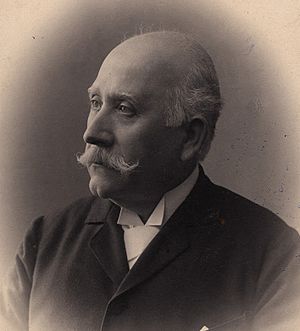Luigi Capuana facts for kids
Quick facts for kids
Luigi Capuana
|
|
|---|---|
 |
|
| Born | 28 May 1839 Mineo, Two Sicilies |
| Died | 29 November 1915 (aged 76) Catania, Sicily, Italy |
| Occupation | Author, journalist |
Luigi Capuana (born May 28, 1839 – died November 29, 1915) was an Italian writer and journalist. He was a very important part of the verist movement in literature. This movement focused on showing life exactly as it was, without making things seem better or worse than they really were.
Luigi Capuana was born around the same time as another famous Italian writer, Giovanni Verga. Both were born in the province of Catania, Sicily. Capuana was also one of the first Italian writers to be inspired by Émile Zola, a French author who created a style called naturalism. Naturalism was similar to verism, trying to show life scientifically and realistically. Capuana also wrote poems in the Sicilian language, which was his local language.
He wrote many different kinds of works, including plays for the theater, short stories, and novels. Some of his famous novels include Giacinta and Marchese di Roccaverdina.
Contents
Luigi Capuana's Life Story
Early Life and Education
Luigi Capuana was born in a town called Mineo, in Sicily. His family was quite rich and owned land in the area. He went to school in his hometown.
In 1851, when he was about 12 years old, he started studying at the Royal College of Bronte in Catania. However, he left after only two years because he wasn't feeling well. Even though he left school, he kept learning by teaching himself.
After finishing his basic studies, he enrolled in law school at the University of Catania in 1857. But he didn't finish law school. In 1860, he decided to join Giuseppe Garibaldi's movement, which was working to unite Italy. He became a secretary for a secret group in Mineo and later helped with the local government.
Starting His Literary Career
In 1861, Capuana published a play called Garibaldi. A few years later, in 1864, he moved to Florence to start his "literary adventure." In Florence, he met many important Italian writers of that time.
He began publishing his first essays, which were critical writings about literature, in a magazine called "Italian Review" in 1865. In 1866, he became a theater critic for a newspaper called "Nation." The next year, in 1867, he published his first short novel, Dr. Cymbalus, in a Florentine newspaper. He stayed in Florence until 1868.
Returning to Sicily
In 1868, Capuana went back to Sicily. He only planned to stay for a short time, but his father passed away, and his family faced money problems. This meant he had to stay on the island.
During this time, he worked as a school inspector and later as a counselor for his hometown of Mineo. Eventually, he was even elected as the mayor of Mineo.
While in Sicily, he learned a lot about the ideas of a philosopher named Georg Wilhelm Friedrich Hegel. He was especially interested in a theory about how different types of literature develop and change over time.
Later Years in Catania
In 1902, Capuana moved to Catania. He started teaching at the local university, where he lectured on words and their meanings (lexicography) and how to write well (stylistics).
Some of his last books included "Coscienze" (published in 1905), "Nel paese di Zàgara" (1910), and "Gli Americani di Rabbato" (1912).
Luigi Capuana passed away in Catania on November 29, 1915. This was shortly after Italy joined the First World War.
Example of His Poetry in Sicilian
Sta notti... (Tonight)
Here is an example of a poem Luigi Capuana wrote in the Sicilian language, along with its English translation.
| Sicilian | English |
|---|---|
| Sta notti mi sunnai quattru funtani, | Tonight I dreamt of four fountains |
| Quattru pedi d'aranciu a lu ciuriri; | Of four orange trees about to blossom; |
| Vitti li stiddi scinniri e acchianari, | I saw the stars descend and ascend; |
| Vitti lu suli comu un lebbru jiri; | I saw the sun run like a hare; |
| Vitti n'aquila fina a lu vulari, | I saw a fine eagle ready to soar, |
| Vitti lu cori tò npettu viniri; | I saw your heart come into my breast; |
| Ca siddu mi putieva arrisbigghiari, | And could I have awakened, |
| Nun ti l'avissi cchiù lassatu jiri. | I would never have let you go. |
See also

- In Spanish: Luigi Capuana para niños
 | Georgia Louise Harris Brown |
 | Julian Abele |
 | Norma Merrick Sklarek |
 | William Sidney Pittman |

